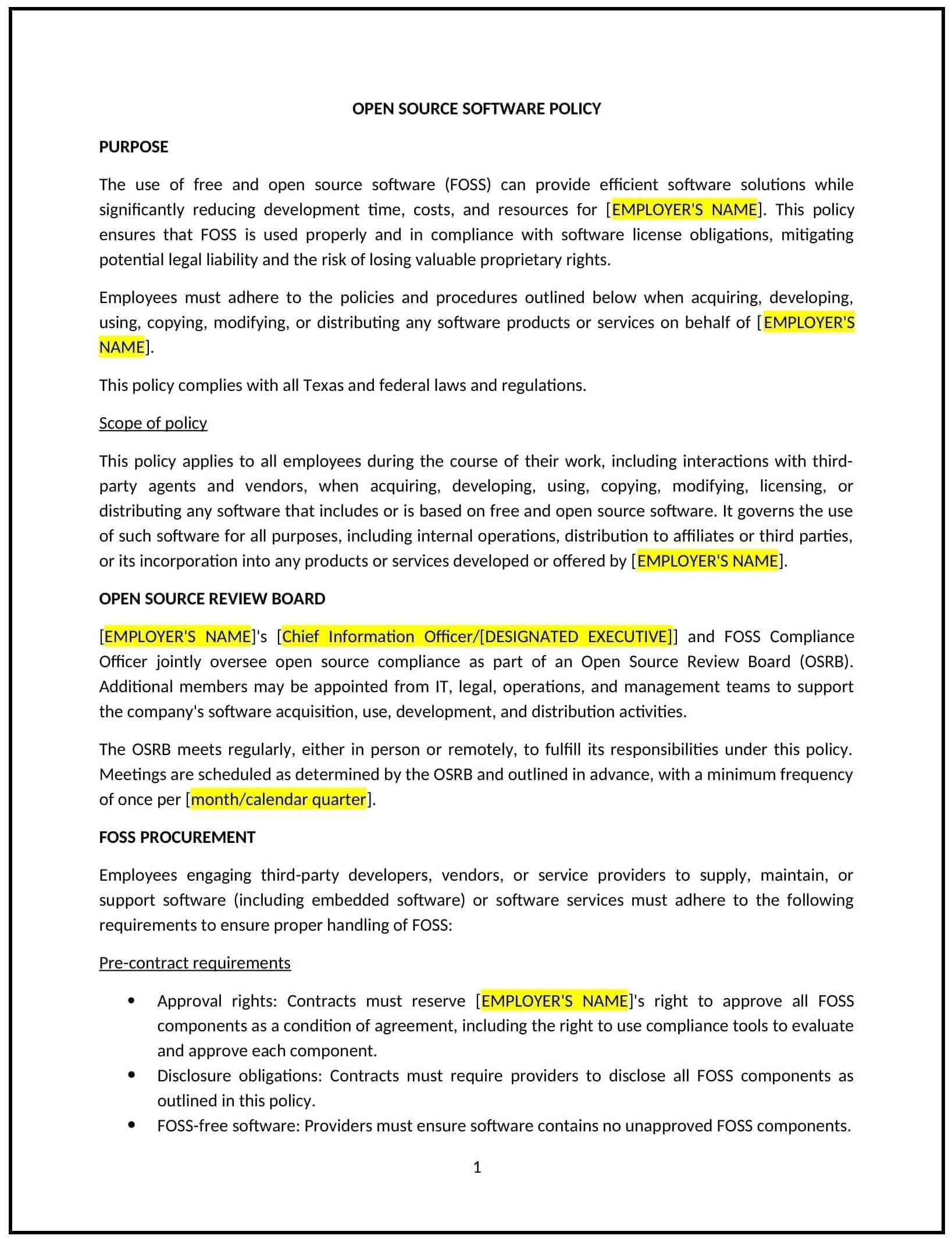Got contracts to review? While you're here for policies, let Cobrief make contract review effortless—start your free review now.

Customize this template for free
Open source software policy (Texas)
This open source software policy is designed to help Texas businesses establish clear guidelines for the use, contribution, and distribution of open source software within the organization. The policy aims to improve the company’s compliance with licensing agreements, protects intellectual property, and fosters a culture of innovation while mitigating legal risks related to open source software.
By adopting this policy, businesses can encourage responsible use of open source software, enhance compliance with legal requirements, and protect the company’s software development and distribution practices.
How to use this open source software policy (Texas)
- Define open source software: Clearly define what constitutes open source software, including any software that is released under an open source license and made publicly available for use, modification, and distribution.
- Specify acceptable use: Outline which open source software can be used within the company, emphasizing the importance of using software that complies with the company’s legal and security standards. Ensure that the policy covers software for both development and operational use.
- Address licensing requirements: Provide guidelines for ensuring that any open source software used or distributed by the company complies with the terms and conditions of its respective licenses. The policy should specify that employees must review and understand open source licenses before using or contributing to the software.
- Set contribution guidelines: If employees contribute to open source projects, outline the process for doing so. Specify whether contributions should be made under the company’s name or as individuals, and provide guidelines for ensuring that no company-owned intellectual property is inadvertently shared without proper authorization.
- Protect intellectual property: Ensure that employees understand the importance of safeguarding the company’s intellectual property. Provide guidelines for avoiding the unintended release of proprietary code, tools, or information when using or contributing to open source projects.
- Implement a review process: Establish a process for reviewing and approving open source software before it is adopted or used within the company. The review process should assess licensing compatibility, security risks, and alignment with company needs.
- Address compliance monitoring: Set expectations for monitoring compliance with open source licenses, including periodic audits of software used in the company’s operations or development processes.
Benefits of using this open source software policy (Texas)
This policy offers several benefits for Texas businesses:
- Mitigates legal risks: By ensuring compliance with open source licenses, the policy helps reduce the risk of legal issues related to the unauthorized use or distribution of open source software.
- Promotes innovation: By providing a framework for the responsible use of open source software, businesses can leverage community-driven innovation while maintaining control over their intellectual property.
- Protects intellectual property: The policy ensures that company-owned intellectual property is not inadvertently shared or compromised when contributing to open source projects or using open source software.
- Encourages transparency: With clear guidelines for using and contributing to open source software, businesses can create a transparent and accountable process that minimizes the risk of security or licensing violations.
- Enhances security: A review process for open source software ensures that only trusted and secure software is adopted, helping to safeguard the company’s technology infrastructure and data.
Tips for using this open source software policy (Texas)
- Communicate the policy clearly: Ensure that all employees, particularly those in IT, software development, and legal teams, are aware of the policy and understand the rules for using and contributing to open source software.
- Train employees: Provide training on open source licenses, including common types of open source licenses (e.g., GPL, MIT, Apache) and their legal implications. Ensure employees understand how to review and comply with these licenses.
- Implement a software approval process: Establish a formal process for evaluating open source software before it is adopted, ensuring that it aligns with the company’s legal, security, and operational needs.
- Monitor compliance: Regularly audit the company’s use of open source software to ensure that all software is used in compliance with the applicable licenses and that no proprietary information is being shared improperly.
- Update the policy regularly: Review and update the policy periodically to reflect changes in Texas state laws, federal regulations, and industry best practices regarding open source software usage and licensing.